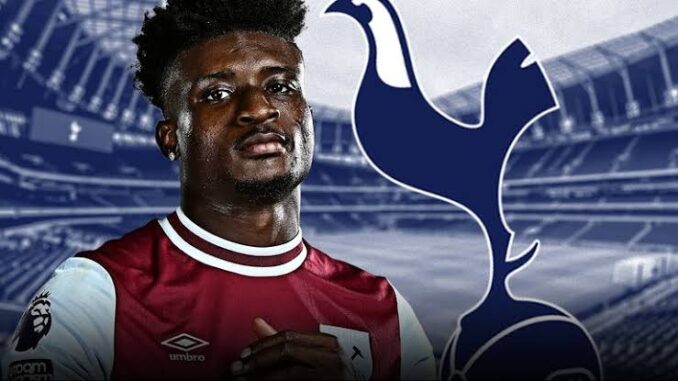
When Mohammed Kudus sealed his £55 million move to Tottenham Hotspur this week, many in the football world were stunned. Not by his talent — that has never been in question — but by the destination. Spurs, a club on the rise but still rebuilding, weren’t considered front-runners. Liverpool and Arsenal, both long-time admirers of Kudus, were reportedly circling. So why did the Ghanaian star choose the Lilywhites?
The answer lies in a mix of ambition, timing, personal growth, and most importantly — a manager’s vision that aligned perfectly with Kudus’ next step.
🔍 The Premier League Proving Ground
Kudus had already conquered Eredivisie football with Ajax and showed flashes of brilliance at West Ham, including a standout European campaign. But while his time in East London gave him Premier League experience, it wasn’t the platform he envisioned for long-term success.
According to sources close to the player, Liverpool and Arsenal were indeed monitoring Kudus. Liverpool saw him as a long-term successor to Mohamed Salah, while Arsenal were interested in his versatility across the front line. But neither club made a concrete offer — at least not one that met West Ham’s valuation or gave Kudus immediate starting assurances.
Tottenham, on the other hand, came in hard and fast.
⚽ Thomas Frank’s Personal Pitch
Much of Kudus’ decision reportedly came down to new Spurs manager Thomas Frank, who took charge after Ange Postecoglou’s abrupt departure in June. Frank, known for his man-management skills and tactical clarity, flew to Amsterdam during the early stages of negotiation to meet Kudus personally.
According to club insiders, Frank’s presentation focused on three pillars:
Creative freedom,
Tactical centrality, and
Becoming the face of a new Spurs era.
Kudus, who has played in both midfield and attack, was told he’d be a central figure in Spurs’ new attacking blueprint — with freedom to roam, dictate tempo, and operate as a hybrid No. 10/false nine. That role didn’t exist at Liverpool or Arsenal, where established hierarchies and formations might have restricted him.
“Thomas Frank didn’t just want Kudus — he wanted to build around him,” a source close to the club revealed.
🧠 Development Over Prestige
Another factor in Kudus’ decision was his own maturity. Now 24, he’s no longer a raw talent hoping for minutes — he’s ready to lead. Spurs offered a longer-term vision where he wouldn’t be part of a rotation system, but a foundational piece of a project.
At Arsenal, Bukayo Saka and Martin Ødegaard dominate the creative roles. At Liverpool, Salah (if he stays), Luis Díaz, and Dominik Szoboszlai already anchor the attacking third. Kudus would have to fight for minutes — and possibly even play out of position.
Spurs offered clarity, autonomy, and responsibility.
“He didn’t want to be a luxury signing,” noted a former coach at Ajax. “He wanted to be the heartbeat of something.”
💰 The Financial Package Helped — But Wasn’t Everything
Though not the deciding factor, Kudus’ Spurs deal is believed to include a significant wage increase from his West Ham contract, along with performance bonuses tied to goals, assists, and European qualification. While Arsenal and Liverpool could likely match those numbers, neither was willing to do so for a player they didn’t plan to immediately start.
Tottenham’s board, keen to avoid another season of mid-table drift, backed Frank’s push and signed off on what is now one of the club’s most expensive transfers ever.
🇬🇭 Personal Comfort and Cultural Fit
It also helps that Spurs now have a growing African presence, and Kudus reportedly had several conversations with Yves Bissouma and Pape Matar Sarr before finalizing the move. The multicultural environment, combined with the quieter media pressure at Spurs compared to Arsenal or Liverpool, offered Kudus a more stable personal fit.
✅ The Verdict: A Bold, Calculated Bet
While the football world expected Kudus to take a “bigger” step to one of the established elite clubs, the Ghanaian has instead taken a smarter one — to a team where he can be the centerpiece, not just another name on the sheet.
Tottenham may not be in the Champions League yet, but with Kudus driving their attack and Frank at the helm, they just might be soon.